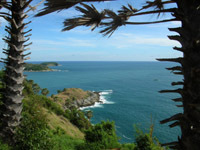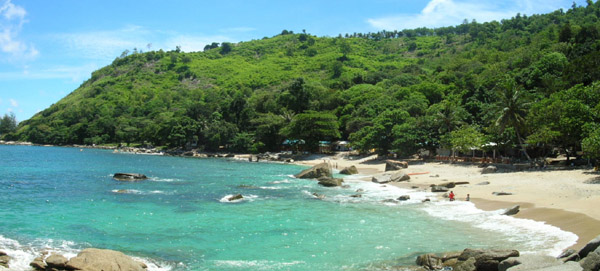Introduction to Phuket
 Phuket
Island is a stunning combination of golden beaches, turquoise seas, green
hills, mangroves and rainforest. Phuket lies in the Andaman Sea surrounded
by beautiful islets and to the northeast, the stunning limestone outcrops
of Phang Nga Bay. Add to this the friendly people, varied cuisine, tropical
climate and range of amenities and you have an ideal destination for a holiday
or long term stay.
Phuket
Island is a stunning combination of golden beaches, turquoise seas, green
hills, mangroves and rainforest. Phuket lies in the Andaman Sea surrounded
by beautiful islets and to the northeast, the stunning limestone outcrops
of Phang Nga Bay. Add to this the friendly people, varied cuisine, tropical
climate and range of amenities and you have an ideal destination for a holiday
or long term stay.
Phuket's wealth originally came from tin mining. The tin mining boom started in the eighteenth century and brought a wave of migrants including many Chinese to labour in the mines. Their descendants form a large chunk of today's population with 30 percent of Phuket Thais coming from Chinese descent. Many of the older Chinese families in Phuket have gone on to be influential in Phuket's business circles.
Rubber was introduced to Phuket at the start of the twentieth century to provide an alternative source of income to tin mining. Today rubber plantations still cover large portions of Phuket's lowlands.
When tin and rubber prices dropped dramatically in the 1970's, a new industry was needed to maintain Phuket's economy. Over the past four decades, Phuket has developed into one of Asia's foremost tourist destinations with more than four million visitors a year. Do not worry about the number of visitors. Phuket is a big island and you can get away from the crowds if that is what you want.
The money brought into the island by tin mining, rubber and now tourism has made Phuket the second wealthiest province in Thailand after Bangkok. And with the money has come a lot of development. The growth over the last fourty years has been quite extraordinary. As recently as the 1970's there were only two telephones on the entire island. Around the beaches were only small fishing villages connected to the rest of the island by dirt tracks hacked through the jungle.
Today, Phuket has an excellent infrastructure. There is a good road, electricity and telephone network. Piped water is available across most of the island. There are many up-market hotels and every major beach is developed. There are several major shopping malls and cinemas. The major tourist towns contain all the amenities any visitor could want.
There is no denying that the development has not been all-good. It has detracted from the natural beauty of the island. It seems like a new housing development starts every week and some parts of the island look like a big building site. Most of the development is in the south where buildings line almost every stretch of road. Traffic congestion has become a problem and road improvement projects are constantly underway.
The authorities have taken some actions to try to protect the natural beauty of Phuket. They have introduced laws prohibiting building above 80-meters sea level and introduced height restrictions on buildings near the beach. These are relatively new laws and buildings built before they were introduced are exempt.
They have now started investigating land deeds. This is because in the past developers have collaborated with corrupt land officials to acquire deeds to develop land that was protected or set aside for agricultural use.
There are two national parks on the island protected from the developers.
Despite all the development and the huge number of visitors Phuket still maintains its charm with something for everyone. In Patong you can join the throngs on the beach during the day and you can party hard at night. If you are looking for something quieter then there are numerous hidden beaches. Rent a bungalow and watch the sun sink into the sea while a sipping a cocktail.
Phuket Town is the capital of the island where you can go shopping, view the Sino-Portuguese architecture from the old tin mining days and get a more authentic experience of a Thai town. Alternatively explore the many small islands around Phuket, visit Phang Nga Bay or explore the interior of the island. There are water sports, golf, Thai boxing, temples, shows, events and much, much more. In short, you should never be bored in Phuket.

